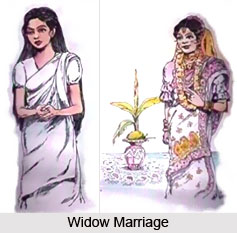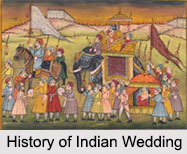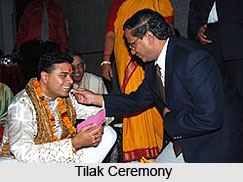 In ancient Indian literature, one can find several references of widow marriage. During the Vedic age, widow marriages were allowed among all the castes. According to Narad Purana, there exist three forms of widow marriages, which are as follows:
In ancient Indian literature, one can find several references of widow marriage. During the Vedic age, widow marriages were allowed among all the castes. According to Narad Purana, there exist three forms of widow marriages, which are as follows:
• For a married woman, who fulfilled the rituals of marriage, but did not live with her husband for a single day.
• For a woman who after leaving her first husband, comes back to him after parting with her second husband
• For a woman, who has been given to any sapinda after her husband expires. Rig-veda prescribes that the widow should give up thinking of her late husband and should accept the marriage proposal of the person who wants to marry her.
The tradition of a widow marrying the brother-in-law of the expired husband was very common. When the dead body of the late husband, was about to be cremated, the dead man`s brother took the widow in his custody and married her soon after. This principal is fully supported in the Yaska`s Nirukta. "Arise, woman, than art lying by one, whose life is gone, come to the world of the living, away from the husband, and become the wife of him, who grasps thy hand, woos thee as a lover`", is quoted in the Hindu Vedic texts.
Vashishtha and Kautilya in Arthashastra have allowed widow marriage. During the Epic era, the marriage of widows was not restricted. According to Manu Smriti, the women who do not experience sexual intercourse with their first husband can remarry. During the middle ages, Chandragupta Vikramaditya married the wife of his dead brother. However, Vashishta and Prashar Smriti are far more liberal in their approach, they believe that if their husband dies, disappears, becomes a saint, is impotent or becomes penniless, the wife can remarry".
From the beginning of 10th to 11th century AD, widow marriages were not encouraged and they were universally prohibited. The sati custom sustained and the condition of the widows in the Hindu society became terrible. Hard line widowhood led to illegitimate sexual relations, kidnapping, prostitution and illicit children. Thus, no woman should be enforced to lead a life of widowhood against her wishes. Every woman wishes to be a mother and therefore child widows and widows without children should be encouraged to remarry. From the humanitarian point of view, for womanhood, the mass should be compassionate about the widows. They too are allowed to lead a happy and complete life. For the freedom of child widows and as a check on immorality widows the government became aware and initiated them to remarry.
The Hindu Widow Remarriage Act of 1856 legalized validity of widow`s remarriage. Moreover, Hindu Succession Act, 1956 and Hindu Marriage Act, 1955, also features provisions of remarriage of the widows.
More on Indian Marriage Customs
More on Indian Wedding Accessories
More on Indian Religious Weddings
More on Types of Marriages
See also
 In ancient Indian literature, one can find several references of widow marriage. During the Vedic age, widow marriages were allowed among all the castes. According to Narad Purana, there exist three forms of widow marriages, which are as follows:
In ancient Indian literature, one can find several references of widow marriage. During the Vedic age, widow marriages were allowed among all the castes. According to Narad Purana, there exist three forms of widow marriages, which are as follows:



















